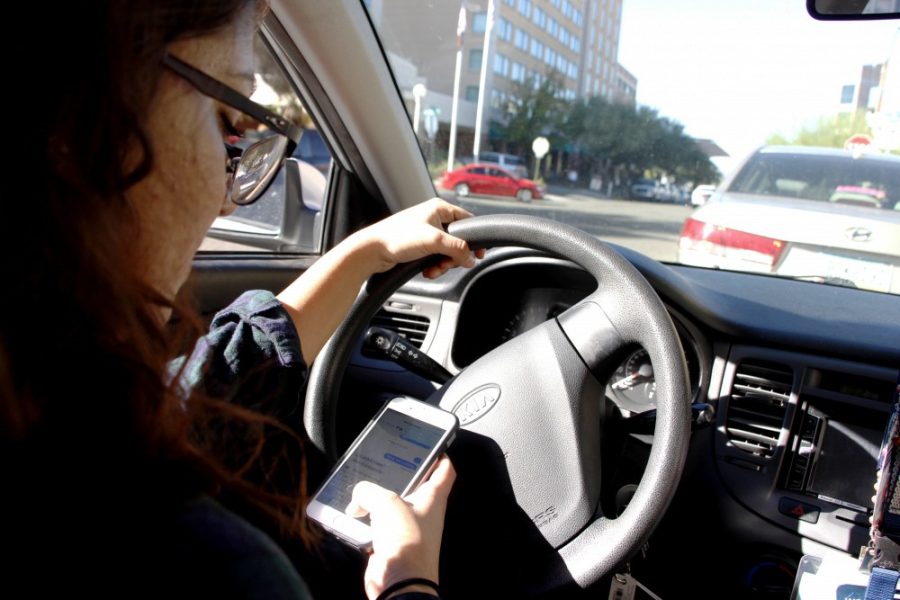The Tucson City Council discussed a new proposed ordinance regarding new penalties for distracted driving during its Tuesday night meeting.
Under this proposed ordinance, distracted driving, which includes any use of mobile handheld devices, would be considered a secondary offense. A secondary offense means a driver would have to be pulled over for an offense such as speeding first, and then be additionally charged with distracted driving.
A driver who creates a collision because of distracted driving may also be subject to a minimum $250 fine, although Ward 3 Council member Karin Uhlich proposed that this amount should be greater.
Lee Ryan, professor and head of UA’s psychology department, said using devices while driving is made more difficult when senses such as sight and motor skills have to work simultaneously, as opposed to when senses such as sight and hearing can work independently.
“When you’re trying to do these two things that have so much perceptual and motor overlap, that’s when you run into problems,” Ryan said.
Ryan compared enforcing fines for distracted driving to when fines were first enforced to make people wear seat belts.
“It is an effective way to get people to engage in a behavior, or in this case, not engage in a behavior,” Ryan said. “We know it works with seat belts, so maybe it will be effective. We’ll have to wait and see.”
The council defined a mobile communication device and a portable electronic device as a wireless communication device used for calls, texts, pictures and data, but excludes devices that can be physically integrated into the vehicle during use, such as by Bluetooth.
RELATED: Arizona ranks No. 1 nationally for DUI enforcement
Ward 6 Councilmember Steve Kozachik said Pima County’s current ban on just texting while driving is a primary offense. If the ordinance passes, the council will reexamine its efficacy after six months to decide if the measure should also be considered a primary offense.
Kozachik said UA student drivers are one of the main groups the council will be evaluating to decide if the proposed ordinance can actually decrease distracted driving.
Ward 2 Councilmember Paul Cunningham said he believes the council should make the ordinance a primary offense after the six-month education period.
“Too many people are in accidents because of distracted driving,” Cunningham said in the study session on Tuesday.
 Cunningham introduced Brendan Lyons in the study session, a former firefighter who now advocates for safe driving habits after he and his girlfriend at the time were hit while bike riding by a car going 45 miles per hour. Lyons said he suffered injuries, including six fractured vertebrae and a fractured pelvis, ending his firefighting career.
Cunningham introduced Brendan Lyons in the study session, a former firefighter who now advocates for safe driving habits after he and his girlfriend at the time were hit while bike riding by a car going 45 miles per hour. Lyons said he suffered injuries, including six fractured vertebrae and a fractured pelvis, ending his firefighting career.
He said in the council’s study session he believes allowing only specifically hands-free communication makes the ordinance more enforceable than the texting ban.
“The reason we’re even talking about this is because the texting ban is unenforceable,” Kozachik said.
Ward 5 Councilmember Richard Fimbres said in the study session distracted driving policy often becomes a broad issue because of all the different devices that can fall under the category of a “portable electronic device,” such as an MP3 player.
RELATED: Tucson questions texting ban, looks to expand to all use of hand-held devices
Ward 1 Councilmember Regina Romero also discussed the problem of racial profiling intertwining with this proposed ordinance. She cited statistics from the American Civil Liberties Union and the Lawyers’ Committee for Civil Rights of the San Francisco Bay Area in the study session to point out that some research concludes black and Latino people are pulled over by police more often than Caucasian people for the same driving behaviors.
She said she had concerns about this ordinance exacerbating that problem here in Tucson if the distracted driving penalties were made a primary offense. Romero suggested efforts be made to educate the community on what does and does not qualify as distracted driving if it is ever made to be a primary offense.
Tucson Police Department Chief Chris Magnus said he views concerns about racial profiling as “serious and appropriate.”
“Distracted driving cuts across all races, ethnicities and genders,” Magnus said in the study session.
During the meeting following the study session, Richard Estrada, the director of Arizona’s branch of the League of United Latin American Citizens, spoke to the council during the call to audience portion about his concerns that this proposed ordinance could lead to SB 1070-related problems down the road.
While the council debated compromises in the ordinance to address these different concerns, one sentiment was unanimous.
“Distracted driving can have dire consequences on everyone’s life,” Cunningham said.
Follow Jessica Suriano on Twitter.








